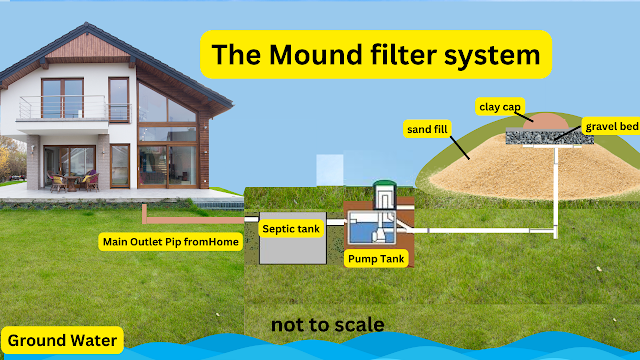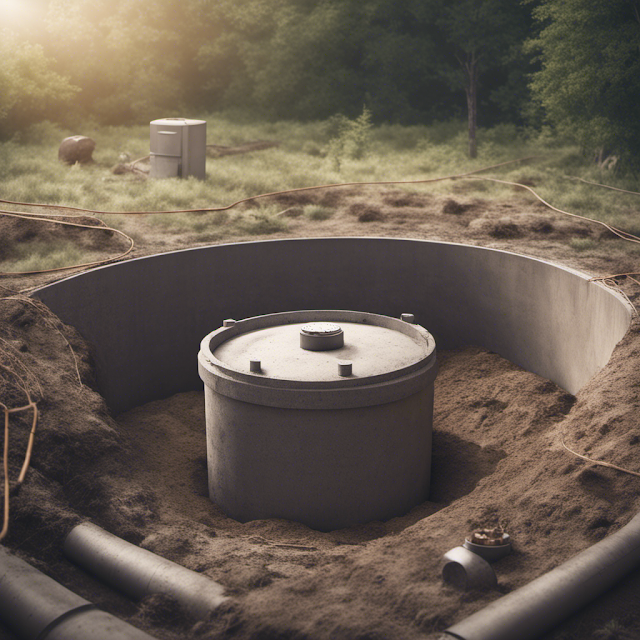The Invisible Threat: Septic Gas and Its Impact on Health and Safety in Residential Settings
 |
| septic gas dangers |
Introduction
As a septic tank operator along with my wife I have over 40 years of experience and now use our knowledge as journalists on septic tanks, our goal is to bring attention to the often-overlooked dangers of septic gas, particularly in residential settings. Septic gas hazards are not only a threat to the environment but also pose significant risks to human health. By understanding these dangers and learning how to manage them, we can help create a safer and healthier living environment for ourselves and our families.
As seasoned professionals with extensive experience in the septic tank industry, we're well-equipped to offer valuable insights and tips to help you optimize the performance and longevity of your septic system. From selecting the right system to avoiding common pitfalls, our guide covers all the key factors to consider when installing or maintaining a septic tank. Now today we cover a really important subject Septic Gas and Its Impact on Health and Safety please take note and care!
Importance of understanding septic gas dangers
Septic gases are a byproduct of the decomposition of organic waste in septic systems. These gases include hydrogen sulfide, methane, carbon dioxide, and other potentially harmful compounds. When inhaled in high concentrations, septic gases can cause a range of symptoms, from dizziness, headaches, and nausea to severe respiratory distress or even death in extreme cases. Prolonged exposure to low levels of septic gases can also result in chronic health issues.
Moreover, these gases can pose a significant threat to the environment by contaminating groundwater and soil, as well as contributing to the greenhouse effect due to their high global warming potential. It is essential to recognize that septic gas dangers are not only a risk to our health but also a potential hazard to our planet.
The risks associated with septic gas exposure are often underestimated or overlooked. Many homeowners may not be aware that these invisible threats can be lurking right beneath their feet or within the walls of their homes. As a septic tank journalists, I aim to shed light on these hazards and empower readers with the information they need to protect their health, their families, and the environment.
Purpose of the guide
The purpose of this guide is to provide an in-depth, comprehensive overview of the various aspects of septic gas dangers in residential settings. We will discuss the different types of septic gases, their characteristics, sources, and the potential health effects associated with exposure. Additionally, we will explore strategies for detecting and mitigating septic gas issues in homes, ensuring that you have the knowledge and tools necessary to address these challenges effectively.
Throughout this guide, we will delve into each topic in detail, offering practical advice and insights based on my experience as a septic tank journalist. Our goal is to equip you with the information you need to maintain a safe and healthy living environment while minimizing the impact of septic gases on your health and the environment.
With this foundation, we can begin our journey into understanding the invisible threat that septic gas poses and how to protect ourselves and our homes from its potential dangers.
Section 1: Identifying Septic Gases
1.1 Septic Tank Gas: An Overview
Septic tank gases are the byproducts of the natural decomposition of organic waste within a septic system. As microorganisms break down waste materials, they release various gases that can accumulate within the septic tank and eventually escape into the surrounding environment or infiltrate homes. There are several common types of septic gases, each with its own set of characteristics and hazards. Let's take a closer look at these gases and their properties.
Hydrogen sulfide (H2S)
Hydrogen sulfide is a colorless, poisonous, and highly flammable gas with a distinct "rotten egg" smell. It is produced by the anaerobic breakdown of sulfur-containing organic materials, such as proteins and sulfates, in the septic tank. At low concentrations, hydrogen sulfide can cause irritation to the eyes, nose, and throat. At higher concentrations, exposure to this gas can lead to more severe symptoms, such as headaches, dizziness, nausea, and even unconsciousness or death in extreme cases.
Methane (CH4)
Methane is a colorless, odorless, and highly flammable gas produced by the anaerobic decomposition of organic waste in a septic tank. Although it does not have a direct impact on human health, methane poses a significant risk due to its flammability and potential to cause explosions when mixed with air in the right proportions. Additionally, methane is a potent greenhouse gas, contributing to climate change and global warming.
Carbon dioxide (CO2)
Carbon dioxide is a colorless, odorless gas that is a natural byproduct of the aerobic decomposition of organic materials within a septic tank. While it is not inherently toxic, high concentrations of carbon dioxide can displace oxygen, leading to an oxygen-deficient environment. This can result in symptoms such as dizziness, shortness of breath, confusion, and even unconsciousness or death in extreme cases.
Other septic gases
Apart from the primary septic gases mentioned above, there are other less common gases that may be present in septic tanks, including ammonia, volatile organic compounds (VOCs), and nitrogen-containing gases. These gases can also contribute to unpleasant odors and may have varying degrees of impact on human health and the environment.
Understanding the common types of septic gases and their properties is the first step in recognizing and addressing the potential dangers they pose in residential settings. In the following sections, we will explore the sources of these gases and the risks associated with exposure in greater detail.
 |
| Septic Gas-Hydrogen Sulfide model |
1.2 Hydrogen Sulfide: The Rotten Egg Culprit
Characteristics and sources
Hydrogen sulfide (H2S) is a colorless, poisonous, and highly flammable gas characterized by its distinct "rotten egg" smell. It is heavier than air and tends to accumulate in low-lying areas or enclosed spaces with poor ventilation. Hydrogen sulfide is formed during the anaerobic breakdown of sulfur-containing organic materials, such as proteins and sulfates, by microorganisms in the septic tank.
The main sources of hydrogen sulfide in septic systems include:
Sewage and wastewater: Human waste, food scraps, and other organic materials in sewage contain sulfur compounds that can be converted into hydrogen sulfide by microorganisms in the septic tank.
Sulfate-reducing bacteria: These bacteria thrive in anaerobic conditions and use sulfate as an electron acceptor, producing hydrogen sulfide as a byproduct of their metabolic processes.
Chemical reactions: Some chemical reactions, such as the reduction of sulfate salts present in water or soil, can also generate hydrogen sulfide.
It is essential to note that hydrogen sulfide can also be produced naturally in various environments, such as swamps, volcanic areas, and natural gas deposits. However, in residential settings, septic systems are the most common source of this noxious gas.
Health effects and symptoms of exposure
Exposure to hydrogen sulfide can have varying effects on human health, depending on the concentration and duration of exposure. At low concentrations (below 10 ppm), hydrogen sulfide can cause irritation to the eyes, nose, and throat, as well as headaches, dizziness, and nausea. These symptoms usually resolve once the individual is removed from the source of exposure.
At moderate concentrations (between 10 and 150 ppm), symptoms may become more severe and include shortness of breath, chest pain, loss of smell, and fluid accumulation in the lungs (pulmonary edema). Prolonged exposure to these concentrations can lead to long-term health problems, such as respiratory issues and damage to the nervous system.
At high concentrations (above 150 ppm), hydrogen sulfide can cause unconsciousness, respiratory failure, and even death in extreme cases. Exposure to levels above 700 ppm can be fatal within minutes.
Recognizing the characteristics and sources of hydrogen sulfide, as well as the potential health effects of exposure, is crucial in identifying and addressing septic gas issues in residential settings. In the next sections, we will discuss strategies for mitigating the risks associated with hydrogen sulfide and other septic gases.
 |
| A septic Gas Methane The Odorless, Flammable Foe |
1.3 Methane: The Odorless, Flammable Foe
Characteristics and sources
Methane (CH4) is a colorless, odorless, and highly flammable gas that is produced as a byproduct of the anaerobic decomposition of organic waste in septic systems. It is lighter than air and tends to accumulate in high, enclosed spaces with poor ventilation. Methane is primarily generated by methanogenic bacteria, which convert the organic compounds in sewage and wastewater into methane and carbon dioxide during their metabolic processes.
The primary sources of methane in septic systems include:
Organic waste: Human waste, food scraps, and other organic materials in sewage contain carbon compounds that can be converted into methane by methanogenic bacteria in the septic tank.
Anaerobic conditions: Methanogenic bacteria thrive in oxygen-poor environments, such as those found in septic tanks and other anaerobic treatment systems.
Health effects and symptoms of exposure
While methane itself is not considered toxic, it can pose significant risks due to its flammability and explosive potential. Methane becomes combustible when mixed with air in concentrations between 5% and 15%. When ignited, a methane-air mixture can cause fires and explosions, resulting in property damage, injuries, or even fatalities.
In addition to its flammability, methane can also displace oxygen in enclosed spaces, leading to an oxygen-deficient environment. Symptoms of oxygen deprivation include dizziness, shortness of breath, confusion, and even unconsciousness or death in extreme cases.
Prevention and mitigation strategies
To reduce the risks associated with methane in residential settings, it is essential to implement prevention and mitigation strategies, such as:
Regular maintenance: Schedule routine inspections and maintenance for your septic system to ensure that it is functioning correctly and to identify any issues before they become severe.
Ventilation: Proper ventilation is crucial in preventing the buildup of methane gas in enclosed spaces, such as basements or crawl spaces. Ensure that your septic system is adequately vented, and consider installing additional ventilation in areas prone to methane accumulation.
Gas detectors: Install methane gas detectors in areas where methane buildup is likely, such as basements, utility rooms, or near septic tanks. These detectors can alert you to the presence of methane before it reaches dangerous levels.
Education and awareness: Learn about the risks associated with methane gas and how to identify and address potential issues. Share this information with family members, neighbors, and other members of your community to increase awareness and promote safety.
By understanding the characteristics, sources, and potential health effects of methane, as well as implementing appropriate prevention and mitigation strategies, you can effectively minimize the risks associated with this odorless, flammable foe in your residential setting
Section 2: Septic Gas Smell and Its Implications
2.1 Detecting Septic Gas Smell
Detecting the presence of septic gases in your home is crucial for maintaining a safe and healthy living environment. Being able to identify the telltale signs of septic gas presence and understanding how to locate its source can help you take the necessary steps to address the issue and protect your family from potential health hazards.
 |
| Septic Gas - Sniffing Danger |
Common indicators of septic gas presence
There are several signs that may indicate the presence of septic gases in your home, including:
Unpleasant odors: A strong, persistent "rotten egg" smell is often the most noticeable indicator of hydrogen sulfide gas. Other septic gases, such as methane or ammonia, may produce less distinct odors that are still indicative of an issue.
Health symptoms: Experiencing symptoms such as headaches, dizziness, nausea, or respiratory irritation can be a sign of septic gas exposure. If you notice these symptoms occurring consistently in specific areas of your home, it may be an indication of a septic gas issue.
Plumbing problems: Gurgling or slow-draining sinks, toilets, or tubs can indicate issues with your septic system or plumbing, which may lead to the release of septic gases into your home.
How to identify septic gas smell in the house
If you suspect that septic gases may be present in your home, there are several steps you can take to identify the source and confirm your suspicions:
Conduct a smell test: Walk through your home and pay close attention to any unusual or unpleasant odors. Be sure to check areas where septic gases are more likely to accumulate, such as basements, crawl spaces, or near plumbing fixtures.
Inspect your plumbing: Check for leaks, cracks, or other damage to your plumbing system that may be allowing septic gases to escape. Pay close attention to areas around toilets, sinks, and drains, as well as vent pipes on your roof.
Check your septic system: Inspect your septic tank and drain field for signs of damage, such as cracks, leaks, or soggy soil. If you notice any issues, contact a septic system professional to assess the situation and recommend appropriate repairs.
Consult a professional: If you are unable to identify the source of the septic gas smell on your own, consider contacting a septic system or plumbing professional to conduct a thorough inspection and help you pinpoint the issue.
By learning how to detect septic gas smells and understanding their implications, you can take the necessary steps to address the issue and protect your home and family from potential health risks.
2.2 Septic Tank Smell in House: Dangerous or Not?
Septic tank smells in your home can be both unpleasant and concerning. Understanding the health risks associated with these odors and knowing when to take action can help you protect your family and maintain a safe living environment.
Health risks associated with septic tank smell
The presence of septic tank smells in your home can indicate the presence of potentially harmful septic gases, such as hydrogen sulfide and methane. As discussed earlier, exposure to these gases can cause various health issues, ranging from mild irritation to severe respiratory problems and even death in extreme cases.
 |
| Septic Gas Health Risks Real but Preventable |
In addition to the direct health risks associated with exposure to septic gases, the presence of these odors can also indicate underlying issues with your septic system or plumbing, which may lead to additional problems such as water damage, mold growth, or structural damage to your home.
When to be concerned and when to seek help
If you notice a persistent septic tank smell in your home, it's essential to take the situation seriously and address it promptly. Here are some situations when you should be concerned and seek help:
The smell is persistent and does not dissipate over time.
You or your family members are experiencing symptoms such as headaches, dizziness, nausea, or respiratory irritation.
You have identified leaks, cracks, or other damage to your plumbing system or septic system components.
The smell is accompanied by other issues, such as slow-draining fixtures, gurgling noises, or soggy soil around your septic system.
In these situations, it's crucial to consult a septic system or plumbing professional to assess the issue and recommend appropriate repairs or mitigation strategies.
Prevention and mitigation strategies
To prevent septic tank smells from becoming a problem in your home, consider implementing the following strategies:
Regular maintenance: Schedule routine inspections and maintenance for your septic system to ensure that it is functioning correctly and to identify any issues before they become severe.
Proper ventilation: Ensure that your septic system and plumbing fixtures are adequately vented to allow septic gases to escape and prevent them from entering your home.
Address plumbing issues promptly: Repair any leaks, cracks, or other damage to your plumbing system as soon as they are identified to prevent septic gases from escaping and causing unpleasant odors in your home.
Educate yourself and your family: Learn about the risks associated with septic tank smells and how to identify and address potential issues. Share this information with your family members to increase awareness and promote a safe living environment.
By understanding the health risks associated with septic tank smells and implementing appropriate prevention and mitigation strategies, you can effectively minimize the potential dangers and maintain a safe and healthy living environment for you and your family.
Section 3: Addressing Septic Gas Issues in Residential Settings
3.1 Proper Septic Tank Maintenance
Proper septic tank maintenance is crucial in preventing septic gas issues in residential settings. Regular inspections and timely maintenance can help ensure that your septic system is functioning correctly and prevent the release of harmful gases into your home.
Routine inspections and pumping schedules
Regular inspections are essential for identifying potential issues and ensuring that your septic system is functioning correctly. It is generally recommended that homeowners have their septic tanks inspected by a professional every 3 to 5 years. However, this timeframe can vary depending on factors such as the size of your septic tank, the number of people living in your home, and the amount of wastewater generated.
In addition to inspections, it is crucial to have your septic tank pumped regularly to remove accumulated sludge and prevent system overloading. Most septic tanks require pumping every 3 to 5 years, but this can also vary depending on the factors mentioned above.
Warning signs of malfunctioning septic systems
Being aware of the warning signs of a malfunctioning septic system can help you address issues before they become severe and lead to septic gas problems. Some common warning signs include:
Persistent foul odors in and around your home
Slow-draining sinks, tubs, or toilets
Gurgling noises in your plumbing
Wet, soggy areas or lush vegetation around your septic tank or drain field
Frequent plumbing backups or overflows
If you notice any of these warning signs, it's essential to consult a septic system professional to assess the situation and recommend appropriate repairs or maintenance.
Prevention and mitigation strategies
Implementing effective prevention and mitigation strategies can help minimize the risk of septic gas issues in your home. Some key strategies include:
Regular maintenance: As mentioned above, schedule routine inspections and pumping for your septic tank to ensure it is functioning correctly and to identify potential issues before they become severe.
Proper waste disposal: Be mindful of what you flush down your toilets and pour down your drains. Avoid disposing of grease, oils, and non-biodegradable items in your septic system, as they can contribute to blockages and system failures.
Conserve water: Reducing your household water usage can help prevent system overloading and minimize the risk of septic gas problems. Fix leaks, use water-efficient fixtures, and avoid running multiple water-using appliances simultaneously.
Monitor your drain field: Keep an eye on your drain field for signs of malfunction, such as soggy soil or unusually lush vegetation. Avoid driving or parking vehicles on your drain field, and refrain from planting trees or large plants too close to the area.
By implementing proper septic tank maintenance practices and addressing potential issues promptly, you can effectively prevent septic gas problems in your residential setting and protect your home and family from potential health risks.
3.2 Ventilation and Odor Control
Proper ventilation and odor control play a crucial role in preventing septic gas issues in residential settings. Ensuring that your septic system and plumbing fixtures are adequately ventilated can help minimize septic gas smells in your home and protect your family from potential health risks.
Importance of proper ventilation systems
A well-designed ventilation system allows septic gases to escape your home safely, preventing them from accumulating and posing health risks to occupants. Ventilation systems also help regulate air pressure within your plumbing system, preventing issues such as sewer gas backflow and maintaining proper wastewater flow.
Inadequate ventilation can lead to a buildup of septic gases in your home, resulting in unpleasant odors and potential health hazards. It can also contribute to plumbing issues, such as slow-draining fixtures and sewer gas backflow.
 |
| ensure adequate ventilation |
Techniques to minimize septic gas smell in the house
There are several techniques you can employ to minimize septic gas smells in your home:
Ensure proper venting: Check that your septic system and plumbing fixtures are correctly vented, and all vent pipes are clear and unobstructed. Vent pipes should extend above the roofline to allow septic gases to dissipate safely.
Install air admittance valves: Air admittance valves (AAVs) can help prevent sewer gas backflow by allowing air to enter your plumbing system while preventing septic gases from escaping. Installing AAVs in areas where venting is insufficient or difficult to achieve can help minimize septic gas smells in your home.
Seal gaps and cracks: Inspect your home for gaps or cracks around plumbing fixtures, such as sinks, toilets, and drains, that may be allowing septic gases to escape. Seal these gaps using appropriate caulking or sealants to minimize septic gas infiltration.
Use odor neutralizers: Place odor neutralizers or air purifiers in areas where septic gas smells are most prevalent to help eliminate or minimize unpleasant odors.
Prevention and mitigation strategies
To prevent and mitigate septic gas issues in your home, consider implementing the following strategies:
Regular maintenance: Schedule routine septic system inspections and maintenance to ensure proper functioning and address any potential issues before they escalate.
Proper waste disposal: Dispose of waste responsibly to prevent blockages and system failures that can lead to septic gas release.
Address plumbing issues promptly: Repair leaks, cracks, or other damage to your plumbing system as soon as they are identified to prevent septic gas infiltration and maintain a healthy living environment.
Educate yourself and your family: Learn about the risks associated with septic gas exposure and how to identify and address potential issues. Share this information with your family members to promote awareness and maintain a safe living environment.
By prioritizing proper ventilation and odor control, you can effectively minimize septic gas smells in your home and protect your family from potential health risks associated with septic gas exposure.
3.3 Emergency Response and Remediation
In the event of a septic gas emergency, it's crucial to act quickly and decisively to protect your health and safety, as well as that of your family. Knowing how to respond in an emergency and when to seek professional assistance can help you effectively address septic gas issues and prevent further complications.
What to do in case of a septic gas emergency
If you suspect a septic gas emergency in your home, follow these steps:
Evacuate: Immediately remove yourself and your family from the affected area, especially if symptoms of septic gas exposure are present, such as dizziness, headaches, or difficulty breathing.
Ventilate: Open doors and windows to increase air circulation and help dissipate septic gases.
Turn off ignition sources: If you suspect the presence of methane or other flammable gases, turn off any ignition sources, such as electrical appliances, pilot lights, or open flames, to reduce the risk of explosion or fire.
Seek professional help: Contact a septic system professional, plumber, or your local emergency services to evaluate the situation and recommend appropriate remediation measures.
Professional assistance and remediation options
In the case of a septic gas emergency, it's essential to seek professional assistance to address the issue effectively and ensure the safety of your home. Depending on the nature of the problem, professional assistance may include:
Septic system inspection and repair: A septic system professional can identify the source of the septic gas issue, assess the condition of your septic system, and recommend necessary repairs or maintenance.
Plumbing repair: A plumber can help address issues with your plumbing system, such as leaks or blockages, that may be contributing to septic gas infiltration.
Indoor air quality testing: In some cases, it may be necessary to have an indoor air quality specialist test your home for septic gas levels and other contaminants to ensure a safe living environment.
Prevention and mitigation strategies
To prevent septic gas emergencies and minimize the risk of septic gas exposure, consider implementing the following strategies:
Regular maintenance: Schedule routine septic system inspections and maintenance to ensure proper functioning and address potential issues before they become severe.
Proper ventilation: Ensure that your septic system and plumbing fixtures are adequately ventilated to prevent the buildup of septic gases in your home.
Address plumbing issues promptly: Repair leaks, cracks, or other damage to your plumbing system as soon as they are identified to prevent septic gas infiltration and maintain a healthy living environment.
Educate yourself and your family: Learn about the risks associated with septic gas exposure and how to identify and address potential issues. Share this information with your family members to promote awareness and maintain a safe living environment.
By understanding how to respond in a septic gas emergency and implementing effective prevention and mitigation strategies, you can safeguard your home and family from the potential dangers associated with septic gas exposure.
Conclusion
The dangers of septic gas exposure in residential settings underscore the importance of public awareness and education on this critical issue. Septic gas issues not only affect the well-being of individuals and families but also have broader implications for the environment and public health. By raising awareness about septic gas dangers and promoting proper septic system maintenance, we can help protect our communities and create a safer living environment for everyone.
Homeowners, contractors, and housing societies all play a crucial role in ensuring safety and proper maintenance of septic systems. Homeowners should prioritize regular septic system inspections and maintenance and address any plumbing issues promptly. Contractors and housing societies must adhere to best practices in septic system design, installation, and maintenance to prevent septic gas issues and protect residents' health and safety.
There is a need for continued research and implementation of safer, more effective wastewater treatment solutions. By investing in innovative technologies and exploring alternative wastewater management strategies, we can minimize the risks associated with septic gas exposure and contribute to a healthier, more sustainable future for all.
As a call to action, let us commit to raising awareness about septic gas dangers, promoting responsible septic system maintenance practices, and supporting advancements in wastewater treatment solutions. Together, we can create safer residential environments and protect the health and well-being of our communities.
FAQs
What diseases can you get from a septic tank?
Exposure to untreated sewage from a septic tank can lead to various diseases and infections. Some of the most common diseases associated with septic tank exposure include:
Gastroenteritis: Caused by bacteria, viruses, or parasites in sewage-contaminated water, gastroenteritis can result in symptoms such as nausea, vomiting, diarrhea, and abdominal pain.
Hepatitis A: A viral infection that affects the liver, Hepatitis A can be contracted through contact with contaminated sewage. Symptoms include fever, fatigue, loss of appetite, and jaundice.
Leptospirosis: A bacterial infection transmitted through contact with water or soil contaminated with the urine of infected animals. Symptoms may include fever, headache, chills, muscle aches, and vomiting.
Cryptosporidiosis: A parasitic infection caused by ingesting contaminated water, resulting in symptoms like diarrhea, stomach cramps, and vomiting.
 |
| Septic Tank Health Risks Gastroenteritis |
Can you get sick from breathing in septic tank?
Breathing in septic tank gases can indeed make you sick. Septic gases like hydrogen sulfide and methane can cause various health issues when inhaled. Exposure to low levels of hydrogen sulfide can result in eye irritation, cough, sore throat, and shortness of breath. Higher concentrations can cause more severe symptoms, such as headaches, dizziness, nausea, and even unconsciousness.
Methane, while not toxic in itself, can displace oxygen in enclosed spaces, leading to suffocation. Additionally, methane is highly flammable and can pose a risk of explosion or fire.
To prevent sickness from breathing in septic tank gases, ensure your septic system is properly ventilated and maintained.
What happens if you smell sewage for too long?
Smelling sewage for extended periods can indicate the presence of harmful septic gases, such as hydrogen sulfide. Long-term exposure to these gases can lead to a range of health issues, including:
Respiratory problems: Chronic exposure to septic gases can irritate the respiratory system, causing coughing, sore throat, and shortness of breath.
Neurological issues: Prolonged exposure to high levels of hydrogen sulfide can cause headaches, dizziness, memory loss, and even unconsciousness.
Eye irritation: Septic gases like hydrogen sulfide can cause eye irritation and burning sensations.
If you consistently smell sewage in your home, it's essential to identify the source of the odor and address any septic system or plumbing issues to protect your health and well-being.
Can a septic tank burst?
A septic tank can potentially burst or collapse under certain circumstances, such as:
Structural failure: Poor construction, substandard materials, or damage to the tank can compromise its structural integrity and cause it to burst.
Corrosion: Over time, the concrete, steel, or plastic materials used to construct septic tanks can corrode and weaken, increasing the risk of a rupture.
Soil pressure: Excessive weight from vehicles or heavy equipment on the ground above the septic tank can put pressure on the tank, causing it to collapse or rupture.
Ground movement: Shifts in the soil due to natural events like earthquakes or landslides can impact the septic tank's stability and cause it to fail.
To prevent a septic tank from bursting, ensure it is properly installed and maintained, avoid driving heavy equipment over the tank, and have regular inspections to identify any potential issues.
Do septic tanks overflow with rain?
Septic tanks can overflow during periods of heavy rainfall, especially if the system is not properly maintained or has poor drainage. When the ground becomes saturated with water, it can be difficult for the drain field to absorb and disperse effluent from the septic tank. This can lead to a backup of sewage into the tank and, in some cases, an overflow of effluent onto the ground surface.
To prevent septic tank overflow during heavy rain, ensure your system is regularly inspected and maintained, keep your drain field clear of obstructions, and consider installing a drainage system to help manage excess water.
What are signs of leaking septic tank?
Some common signs of a leaking septic tank include:
Sewage odor: A strong smell of sewage around the tank or drain field may indicate a leak.
Lush vegetation: If grass or plants near the septic tank or drain field are growing faster and greener than the surrounding area, it could be a sign of leaking effluent.
Wet spots or puddles: Soggy ground or standing water around the septic tank or drain field can indicate a leak.
Slow drains: If sinks, tubs, or toilets are draining slowly or backing up, it could be a sign of a problem with the septic system, such as a leak or blockage.
If you notice any of these signs, contact a septic system professional to inspect and repair any issues with your tank.
Do homes with septic tanks smell?
Homes with properly maintained septic tanks should not have any noticeable odors. However, if you detect a sewage smell in or around your home, it could indicate a problem with your septic system, such as a leak, blockage, or inadequate ventilation.
Regular inspections, proper maintenance, and prompt attention to any issues can help ensure your septic system remains odor-free and functioning correctly.
Is it safe to stay in a house with sewage backup?
Staying in a house with sewage backup can be hazardous to your health due to the risk of exposure to harmful bacteria, viruses, and parasites present in the sewage. In addition, the presence of septic gases like hydrogen sulfide and methane can cause respiratory irritation, headaches, dizziness, and other health issues.
If you experience a sewage backup in your home, it's essential to address the issue promptly by calling a professional plumber or septic system expert to identify and repair the problem. Until the issue is resolved, it's best to avoid the affected area and consider staying elsewhere to minimize your risk of exposure to contaminants and harmful gases.
What does a septic tank smell like?
A septic tank smell is usually characterized by a strong, foul odor similar to rotten eggs. This smell is mainly caused by the presence of hydrogen sulfide gas, which is a byproduct of the anaerobic decomposition of organic waste materials in the septic tank. Other septic gases, such as methane and carbon dioxide, may also contribute to the overall odor. If you notice a persistent septic tank smell in or around your home, it may indicate a problem with your septic system that needs to be addressed.
Can you smell a septic tank in a bathroom?
Yes, you can sometimes smell a septic tank in a bathroom. The smell is usually due to septic gases, such as hydrogen sulfide, which can seep into your home through drains, toilets, and other plumbing fixtures. A septic smell in your bathroom may indicate issues with your septic system, such as a full or leaking tank, a blocked vent pipe, or a damaged drain field. It's essential to identify and resolve the source of the odor to ensure the proper functioning of your septic system and maintain a healthy living environment.
Why does my septic tank stink when it rains?
Your septic tank may stink when it rains due to increased water levels in the drain field. Heavy rain can saturate the soil around your septic system, making it difficult for water to drain properly. This can cause the drain field to become oversaturated, allowing septic gases to escape and create unpleasant odors. Additionally, rainwater can also enter your septic tank through cracks or leaks, causing the tank to overfill and release foul-smelling gases. To prevent septic odors during heavy rainfall, ensure your septic system is properly maintained, and address any issues promptly.
How do I stop my bathroom from smelling like my septic?
To stop your bathroom from smelling like your septic, follow these steps:
Inspect your plumbing system: Check for any leaks, clogs, or other issues that may be causing septic gases to enter your home. Repair any problems as needed.
Ensure proper ventilation: Make sure your bathroom has adequate ventilation, such as an exhaust fan, to help dissipate septic odors. Additionally, ensure your septic system's vent pipes are clear of obstructions.
Clean your drains: Regularly clean your bathroom drains with a mixture of hot water and vinegar to remove any buildup that may be trapping septic odors.
Use odor-neutralizing products: Utilize air fresheners, odor-absorbing gels, or natural solutions like baking soda to neutralize septic smells in your bathroom.
Maintain your septic system: Regularly inspect and maintain your septic system, including pumping the tank as needed, to prevent septic odors from becoming an issue.
How do I stop my septic tank from smelling outside?
To stop your septic tank from smelling outside, follow these steps:
Regular maintenance: Schedule routine inspections and pump your septic tank as needed to prevent overflows and ensure proper functioning.
Check for leaks: Inspect your septic tank, pipes, and drain field for any leaks or damage. Repair any issues promptly to prevent odors from escaping.
Ensure proper venting: Make sure your septic system's vent pipes are clear of obstructions, allowing septic gases to vent away from your home and outdoor living areas.
Maintain your drain field: Keep the area around your drain field clear of heavy vehicles, large plants, and excess water to ensure efficient wastewater treatment and prevent odors.
Use odor-neutralizing products: Apply natural odor-neutralizing products, such as lime, around the septic tank and drain field to help minimize odors.
Why does my water smell like rotten eggs septic tank?
If your water smells like rotten eggs, it may be due to the presence of hydrogen sulfide in your water supply. Hydrogen sulfide can be produced by bacteria in your water heater, plumbing system, or well, and can also be a sign of contamination from your septic system. If you suspect your septic system may be the cause of the odor, it's crucial to have it inspected and address any issues to prevent further contamination and health risks.
Should I call a plumber if my water smells like rotten eggs?
Yes, you should call a plumber if your water smells like rotten eggs. The odor is likely caused by hydrogen sulfide, which can result from bacteria in your water heater, plumbing system, or well, or from contamination due to a malfunctioning septic system. A plumber can help identify the source of the smell and recommend appropriate solutions to address the issue and ensure the safety of your water supply.
Can I put baking soda in my septic tank?
Yes, you can put baking soda in your septic tank. Baking soda is a safe, natural, and environmentally friendly solution that can help control odors and maintain the pH balance in your septic tank. To use baking soda in your septic tank, simply flush a half cup to one cup of baking soda down your toilet once a month. However, it's essential to remember that while baking soda can help control odors, it is not a substitute for proper septic system maintenance, such as regular inspections and pumping.
 |
| Baking Soda For Septic Tanks |
What kills septic smell?
To kill septic smell, you can use the following methods:
Neutralize the odor: Use natural odor-neutralizing products like baking soda, vinegar, or activated charcoal to eliminate septic smells in your home.
Improve ventilation: Ensure proper ventilation in your home, especially in bathrooms and areas near plumbing fixtures, to dissipate septic odors.
Clean your drains: Regularly clean your drains using hot water and vinegar or an enzyme-based cleaner to remove buildup and prevent septic odors from entering your home.
Maintain your septic system: Schedule regular inspections, pump your septic tank as needed, and address any issues promptly to prevent odors and ensure proper functioning.
What are the long-term health effects of septic gas exposure?
Long-term exposure to septic gases, particularly hydrogen sulfide and methane, can have serious health effects. These may include:
Respiratory issues: Prolonged exposure to septic gases can irritate the respiratory system, leading to difficulty breathing, coughing, and other respiratory problems.
Neurological damage: High concentrations of hydrogen sulfide can cause headaches, dizziness, and memory loss, while long-term exposure can potentially result in more severe neurological damage.
Eye irritation: Septic gases can irritate the eyes, causing redness, itching, and potentially more serious eye issues with chronic exposure.
Fire and explosion risks: Methane, a flammable gas, can accumulate in enclosed spaces and pose a risk of fire or explosion if ignited.
It is essential to address septic gas issues promptly to minimize the risk of long-term health effects and ensure a safe living environment.
How can I tell if my septic system is properly ventilated?
A properly ventilated septic system will have the following characteristics:
Clear vent pipes: Vent pipes should be free of obstructions, such as leaves, bird nests, or debris, to allow septic gases to escape safely.
Proper vent pipe placement: Vent pipes should extend above the roofline and be positioned away from windows, doors, and air intakes to prevent septic gases from entering your home.
No septic odors: A properly ventilated septic system should not cause noticeable septic odors in or around your home. Persistent odors may indicate a ventilation issue or other septic system problems.
If you suspect your septic system is not properly ventilated, consult a professional to inspect and address any issues.
Are there any regulations or guidelines for septic system maintenance and safety?
Yes, there are regulations and guidelines for septic system maintenance and safety, which vary depending on your location. Local and state health departments, as well as the Environmental Protection Agency (EPA), often have guidelines for septic system design, installation, maintenance, and inspection. These regulations are in place to protect public health and the environment from contamination and pollution caused by improperly functioning septic systems.
To ensure compliance with regulations and maintain a safe and effective septic system, homeowners should:
Consult local and state regulations for specific requirements regarding septic system maintenance and safety.
Schedule regular inspections and pumping as required by local guidelines or as needed based on your system's usage.
Address any septic system issues promptly to prevent contamination and health risks.
Work with licensed and qualified professionals for septic system installation, maintenance, and repairs.

.png)



.png)






Comments
Post a Comment